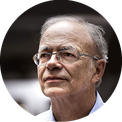Share these talks and lectures with your colleagues
Invite colleagues
Prof. Peter Singer Princeton University, USA
1 TalkBiography
Journalists have bestowed on Prof. Singer the tag of “world’s most influential living philosopher.” They are probably thinking of his work on the ethics of our treatment of animals, often credited with starting the modern animal rights movement, and of the influence that his writing has had on development of... read moreeffective altruism. He is also known for his controversial critique of the sanctity of life ethics in bioethics.
In 2021 he was delighted to receive the Berggruen Prize for Philosophy and Culture. The citation referred to Prof. Singer’s “widely influential and intellectually rigorous work in reinvigorating utilitarianism as part of academic philosophy and as a force for change in the world." The prize comes with $1 million which, in accordance with views he has been defending for many years, he is donating to the most effective organizations working to assist people in extreme poverty and to reduce the suffering of animals in factory farms.
Several key figures in the animal movement have said that his book Animal Liberation, first published in 1975, led them to get involved in the struggle to reduce the vast amount of suffering we inflict on animals. To that end, he co-founded the Australian Federation of Animal Societies, now Animals Australia, the country's largest and most effective animal organization.
Peter is the founder of The Life You Can Save, an organization based on his book of the same name. It aims to spread his ideas about why we should be doing much more to improve the lives of people living in extreme poverty, and how we can best do this.
His writings in this area include: the 1972 essay “Famine, Affluence, and Morality” in which he argues for donating to help the global poor; and two books that make the case for effective giving, The Life You Can Save (2009) and The Most Good You Can Do (2015).
He has written, co-authored, edited or co-edited more than 50 books, including Practical Ethics, The Expanding Circle, Rethinking Life and Death, One World, The Ethics of What We Eat (with Jim Mason) and The Point of View of the Universe (with Katarzyna de Lazari-Radek). His writings have appeared in more than 25 languages.
Peter was born in Melbourne, Australia, in 1946, and educated at the University of Melbourne and the University of Oxford. After teaching in England, the United States, and Australia, in 1999 he became Ira W. DeCamp Professor of Bioethics in the University Center for Human Values at Princeton University. He is now only teaching at Princeton for the Fall semester, and spends part of each year doing research and writing in Melbourne, so that he and his wife Renata can spend time with their three daughters and four grandchildren.
